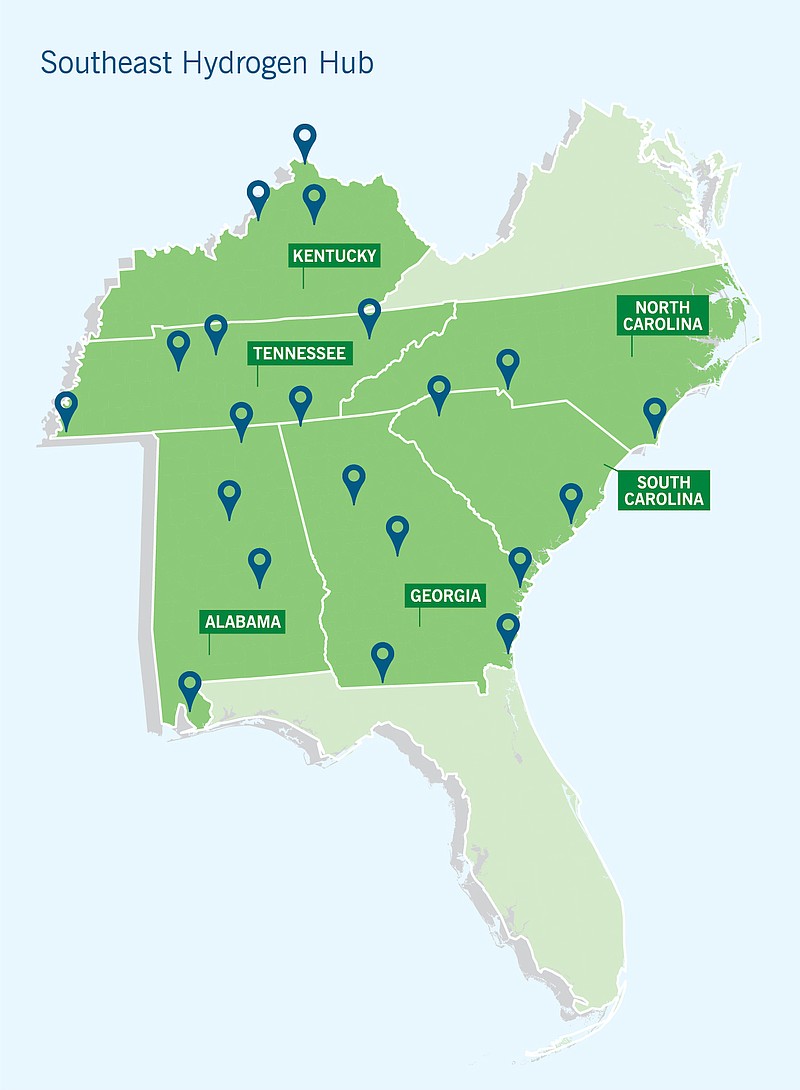While the Tennessee Valley Authority is pursuing new types of power generation in its own territory from the next generation of nuclear, solar, battery and hydroelectric power plants, the federal utility is also partnering with neighboring private utilities to pursue federal grants to develop hydrogen power across the Southeast.
TVA joined this week with four other Southern utilities and the Battelle Corp. to submit a proposal to the U.S. Department of Energy for a Southeast Hydrogen Hub to produce and distribute hydrogen as a cleaner fuel for transportation, industry and power generation in the future.
The coalition of utilities delivered a concept paper to the DOE to begin the process of seeking some of the $7 billion allocated for regional clean hydrogen hubs as part of the infrastructure investment package adopted by Congress last year. The energy department is expected to award grants next year to six to 10 regional hydrogen hubs to match local and industry investments in technologies to develop and distribute hydrogen fuel as a cleaner alternative to traditional fossil fuels.
(READ MORE: TVA issues one of the nation's largest requests for carbon-free energy)
"As a member of the Southeast Hydrogen Hub coalition with Battelle and the Southeast's premier energy providers, we are equipped and ready to maximize development of hydrogen as a much-needed alternative fuel," Joe Hoagland, vice president of TVA innovation and research, said in an announcement of the new venture. "Hydrogen will be crucial for accelerating the transition to clean power so we can meet the demand for low-carbon energy throughout our region and across the country."
The proposed Southeast Hydrogen Hub, if implemented, is projected to cost about $2.5 billion throughout the life of the project and would be funded equally between the DOE and the participating utilities and companies that develop the hub. The proposed Southeast project would create thousands of construction jobs and hundreds of full-time jobs to operate and maintain the hydrogen hub and associated infrastructure and projects, TVA spokeswoman Ashton Davies said in a statement.
Producing hydrogen is an energy-intensive process, and unlike natural gas, there are no pipelines or delivery systems now in place for hydrogen. But backers of the Southeast Hub said the identified sites in the Southeast are near highways, waterways and natural gas pipelines that are ready for use, or can be repurposed or refitted, to support needed clean hydrogen hub configurations.
(READ MORE: TVA to extend pandemic relief credits for a third year)
Each of the participating utilities has pledged to reduce its carbon intensity over time, TVA President Jeff Lyash said. He said Southern utilities could provide cleaner power to produce the hydrogen than other energy producers or utilities that depend on fossil fuels.
"We're committed to reducing our carbon emissions over time even as we expect the demand for our electricity to go up," Lyash told the Chattanooga Times Free Press.
Lyash said electricity demand in TVA's seven-state region could double by 2050 as electric vehicles replace gas-powered cars and industry and homes shift to a greater share of electricity usage to replace natural gas, propane and heating oil. To meet the projected higher demand and replace its aging fleet of coal power plants, TVA is developing plans for small modular nuclear reactors, more solar farms, more purchased renewable energy and new technologies, such as carbon capture for natural gas plants and hydrogen production, for cleaner burning fuels.
Hydrogen is seen as a relatively clean fuel that can be used in various ways, including to power vehicles that are now the biggest source of carbon emissions linked to global warming.
Hydrogen is a dispatchable energy source, meaning it can be turned on or off as needed to enable power utilities to add more intermittent power sources such as solar, wind and hydroelectric power.
"With the nation's leading utilities forming a solid, customer-centered foundation, the Southeast Hydrogen Hub promises to become a new catalyst for economic development and growth, while bringing broad, economywide decarbonization to the customers and communities we serve," Chris Cummiskey, chief commercial officer for the Southern Co., said in a statement about the Hydrogen Hub.
After reviewing the concept proposals submitted this month, the DOE is expected to indicate whether the Southeast Hydrogen Hub coalition should submit a formal application by the end of the year. Such an application will be due to be submitted to the DOE by next April for consideration of the matching federal grants.
Contact Dave Flessner at dflessner@timesfreepress.com or 423-757-6340. Follow him on Twitter @DFlessner1.

